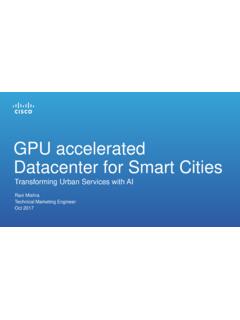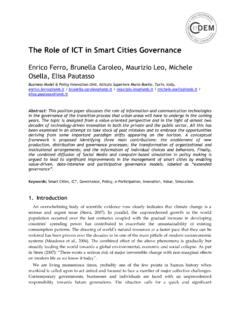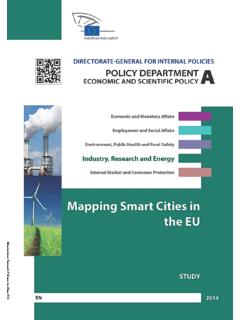Transcription of Getting Smart About Smart Cities - U.S. Local Solutions
1 USDN Resource Guide Getting Smart About Smart Cities2 | Getting Smart About Smart Cities Cover photo credit: Eric Fischer, Smart About Smart Cities was compiled for the Urban Sustainability Directors Network (USDN) by Nutter Consulting and the Institute for Sustainable Bent, Michael Crowley, Melanie Nutter, and Claire Wheeler researched, wrote and reviewed this document. Lindsey Chamberlin designed all THE INSTITUTE FOR SUSTAINABLE COMMUNITIESS ince its founding in 1991 by former Vermont Governor Madeleine Kunin, ISC has led 99 transformative, community- driven projects in 30 countries. ISC specializes in developing and delivering highly successful training and technical assistance programs that improve the effectiveness of communities, their leaders, and the institutions that support NUTTER CONSULTINGB ased in San Francisco, CA, Nutter Consulting helps Cities , nonprofits, foundations and businesses leverage innovation strategies and Smart Cities tools to meet their sustainability goals.
2 Led by Melanie Nutter, former Director of the San Francisco Department of the Environment and former Deputy Director for Speaker of the House Nancy Pelosi, Nutter Consulting specializes in advancing carbon emission reduction and climate adaptation efforts through program development, strategic planning, public policy development, communications, media strategy and coalition THE URBAN SUSTAINABILITY DIRECTORS NETWORK The Urban Sustainability Directors Network (USDN) is a peer-to-peer network of Local government professionals from over 120 Cities across the United States and Canada dedicated to creating a healthier environment, economic prosperity, and increased social equity. This dynamic network enables sustainability directors and staff to share best practices and accelerate the application of good ideas across North Smart About Smart Cities | 3 Contents5 USDN Innovation Fund: Advancing Smart & Sustainable Cities Project Working Group Smart Cities : An Emerging Field Defining Smart Cities Big Data and the Internet of Things The Smart City Technology Stack Emerging Smart Cities Frameworks14 The Intersection of Smart Cities & Sustainability: Key Approaches and Promising Practices1.
3 Bridge Government Silos through Digital Strategies2. Embrace New Staff Capacities and the Changing Role of IT3. Develop Partnerships with the Tech Sector4. Master the Art of Innovation and Rapid Adoption5. Engage Citizens through Open Source Apps6. Focus on Data Privacy7. Reinvent Innovation-Friendly Procurement Systems24 Conclusion 25 Glossary 27 Appendix 1: Smart City Resources 31 Appendix 2: Smart City Frameworks 4 | Getting Smart About Smart Cities THE AMOUNT OF DATA IN THE WORLD IN PETABYTESENOUGH DATA TO STACK DVDS TO THE MOON & BACK20 MILLION PETABYTESBY 2020 THE STACK WILL BE HALFWAY TO GIGATONSPOTENTIAL Smart CITYGHG REDUCTIONSBY 2020 LESS THAN 1990 BILLION DEVICESCONNECTED TO THE INTERNET TODAYIN 4 YEARS THAT NUMBER WILL GROW TO9 BILLIONTop infographic: GeSI SMARTer 2020: The Role of ICT in Driving a Sustainable Future; The Boston Consulting Group and the Global e-Sustainability Initiative (GeSI), 2012.
4 Infographic: The Digital Universe Decade Are You Ready? IDC iView, John Gantz and David Reinsel, 2010. infographic: Here s Why The Internet Of Things Will Be Huge, And Drive Tremendous Value For People And Businesses, Business Insider, 2013; Emily Adler. Smart About Smart Cities | 5 Supported by grant funding from the Urban Sustainability Directors Network Innovation Fund, the Advancing Smart & Sustainable Cities Project is a collaboration of high-level sustainability, technology & innovation practitioners from within 12 US & Canadian city governments intended to identify Smart city tools and develop approaches that will best advance sustainability goals and increase citizen engagement. The project s ultimate goal is to develop the voice of the city customer in the nascent Smart city market by providing guidance to city staff in developing Smart city strategies; and by communicating the needs of municipal governments in the use, and rollout of, Smart city technology to the wider Smart city that end, the project explores the following: Issues and decisions involved in creating Smart city deployment strategies for Local governments The benefits and challenges of implementing such strategies Definitions of Smart Cities and related frameworks The first USDN Smart Cities Summit was held at the Presidio Graduate School in San Francisco on August 6-8, 2014.
5 The summit brought together the project s 12 participating Cities , including Sustainability Directors, Chief Technology Officers, Innovation Officers, and select private sector representatives to share experiences and best practices, and to agree on next steps to advance partnerships between public and private resource guide is an initial step in identifying shared challenges, opportunities and promising practices in using Smart city technologies and strategies that were discussed during the summit. The guide also provides an initial knowledge base that will function as a working foundation for sustainability, innovation, and IT professionals as they delve deeper into the Smart Cities Innovation Fund: Advancing Smart & Sustainable Cities Project Working GroupPhoto credit: Brian Koprowski, Smart and Sustainable Cities Project Working GroupBoston, MABoulder, COBurlington, VTChicago, ILColumbia, MOHouston, TXPalo Alto, CARaleigh, NCSan Francisco, CASeattle, WAVancouver, BCWashington, DC6 | Getting Smart About Smart Cities Most of the current literature on Smart Cities focuses on the marketplace ( new apps, tools, and technologies), and is written primarily for private sector practitioners.
6 It is our belief that in order for municipal governments to realize the full potential in this emerging market, they must first address fundamental change management challenges associated with the adoption of new technologies and ways of doing business. This guide addresses this issue by supporting city government practitioners in navigating issues such as the disruptive nature of big data and Information and Communications Technology (ICT), the proliferation of innovation within the public sphere, and the intersection between sustainability and Smart Cities . The project is managed by Nutter Consulting in partnership with the Institute for Sustainable Communities (ISC). Participating Cities include Boston, MA; Boulder, CO; Burlington, VT; Chicago, IL; Columbia, MO; Houston, TX; Palo Alto, CA; Raleigh, NC; San Francisco, CA; Seattle, WA; Vancouver, BC and Washington, Cities : An Emerging FieldBy 2050, the global population is expected to grow to over nine billion, and 80 percent of that population will reside in Cities .
7 Today, Cities are home to just over half of the global population of seven billion. Meanwhile, Cities comprise just two percent of the Earth s land mass and are responsible for the consumption of 80 percent of the Earth s resources. The accelerating growth of Cities and their disproportionate consumption of physical and social resources are unsustainable, as are the traditional systems Cities rely upon to deliver resources. While urbanization continues to contribute to increased carbon emissions globally, Local action is critical for achieving a low carbon future. In the absence of binding international climate action as well as limited leadership in many state governments, Cities are now taking the lead and developing strategies to address climate change impacts. In many respects, Cities are our best hope for tackling climate change.
8 This guide outlines the possibilities that ICT, big data and other Smart technologies present as potential transformative means for achieving a citizen-centric, low carbon future. Cities have always been complex. As new methods for creating, communicating, and using data continue to emerge, information and infrastructure become more interconnected and the complexity of Cities is elevated. Increasingly, Cities are employing digital systems to communicate with citizens and stakeholders, utilizing data and information for planning and service delivery, and honing the digital skills required to participate in society and be economically Cities to become both Smart and sustainable more environmentally sound, economically prosperous and socially just they must integrate the use of big data and ICT both into daily processes and in the pursuit of their pressing Smart About Smart Cities | 7 Defining Smart CitiesThere is currently no universally accepted definition of a Smart city; approaches vary as widely as the culture, priorities, and histories of Cities , this is not for lack of trying.
9 Many entities have proposed definitions:A Smart city uses information and communications technology (ICT) to enhance its livability, workability and sustainability. Smart City Readiness Guide, 2013 The effective integration of physical, digital and human systems in the built environment to deliver a sustainable, prosperous and inclusive future for its citizens. Smart City Framework, 2014 While some people continue to take a narrow view of Smart Cities by seeing them as places that make better use of information and communication technology (ICT), the Cities I work with all view Smart Cities as a broad, integrated approach to improving the efficiency of city operations, the quality of life for its citizens, and growing the Local economy. Fast Company article, What Exactly Is a Smart City? , 2012 Smart Cities CouncilBritish Standards InstitutionBoyd CohenInvestments in human and social capital and traditional (transportation) and modern (ICT-based) infrastructure fuel sustainable economic growth and a high quality of life, with a wise management of natural resources, through participatory government.
10 Caragliu, Bo, and Nijkamp, Smart Cities in Europe, 2009 Smart Cities Europe8 | Getting Smart About Smart Cities As a starting point, the project s working group advanced the following initial definition: Smart Cities Solutions use advanced information and communication technologies to collect, communicate, and analyze data to improve the design and operations of a city s core systems and programs, as well as citizen engagement, for greater efficiency and effectiveness, thus improving the city s sustainability, resilience, bottom line and quality of urban government practitioners, this definition is as much About new ways to integrate sustainability practices across departments and sectors as it is About new tools and technologies. It represents a completely new approach to creating a sustainable city that treats data as a foundational tool for making smarter city Solutions will always be as diverse as the Cities they serve.









